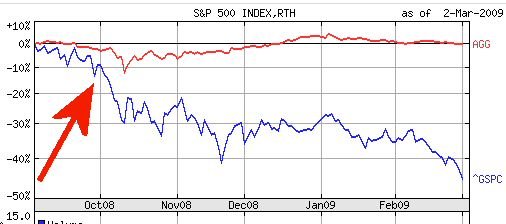stephenandrew
Recycles dryer sheets
- Joined
- May 5, 2007
- Messages
- 148
I suppose that I have always considered myself to be relatively knowledgebale about the markets and investing. I am 46 now, and since I got my first job out of college, I have been dollar cost averaging into low cost index funds for my 401-K, IRA's etc. I always "knew" that in the long run equities were the place to be, and that I would be rewarded for taking staying the course (to parapharase my friends at Vanguard). Along the way, I remember scoffing, laughing to myself as I heard my coworkers and friends speak about investing their retirement monies in CDs, short term Treasuries, and the like. I "knew" that they would ultimately find themselves in a positon of having too little capital to adeqautely fund their retirement, because of their failure to see the relationship between risk and reward. Over thee years I had accumulated a pretty substantial sum of money--obviously the recent losses have set me back considerably. Frankly, with my large exposure to equities, I am embarrassed to say how much I have lost, but suffice it to say is the hundreds of thousands of dollars. But looking back on it now, the thing that strikes me most is the contempt (best word I can think of) I had for those who failed to see the way to financial secuirty was through the long term investing in equities. Is it really the best way?---I think the answer is mostly "yes", but depending on when you pass thorugh this life, the answer may be "no". In retrospect, I should have had more respect for those who were "afraid" of the market, not because they were right (atleast it appears so now), but because it showed me I did not have enough repsect for the risks involved with investing. The fact that something is 90% certain, does not make it certain. I should have been more understanding of their concerns, perceptions of risk, and not assumed that "my" way was the best way.


